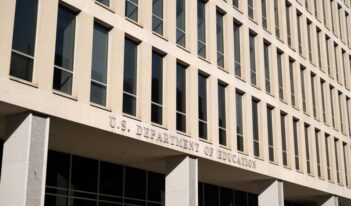
The Trump Administration’s recent proposal on Title IX would bolster due process rights of students.
I am a frequent critic of the Trump Administration because of its many departures from legal norms. But in fairness I should acknowledge a rare occasion when the Trump Administration has adhered to the rule of law. In fact, the Trump Administration has dramatically improved one agency’s compliance with legal norms after the Obama Administration departed significantly from the legal norms that all administrations should honor and uphold.
Last November, the U.S. Department of Education proposed a rule that would govern cases in which universities receive complaints that a student raped, sexually assaulted, or sexually harassed another student. Title IX of the Civil Rights Act confers power on the Education Department to regulate this aspect of university behavior on the theory that a university discriminates against women unless it has an adequate means of determining whether a student has committed an act of sexual misconduct against another student and the ability to suspend or expel any student who engages in such conduct. The rule proposed by the Trump Administration would allow students who are accused of such sex crimes to cross-examine, directly or indirectly, their accusers and other witnesses against them.
The notice of proposed rulemaking issued by the Trump Education Department provides a stark contrast with the way that the Obama Administration addressed the problem of sexual misconduct by university students.
During the Obama years, the Education Department consistently refused to conduct a notice-and-comment rulemaking to decide how to regulate the procedures that universities use to investigate and adjudicate charges of sexual misconduct by students against other students. The Education Department relied entirely on “Dear Colleague” letters that the department sent to universities recommending procedures that universities should use in investigating and adjudicating such cases. The Dear Colleague letters urged universities not to allow students who were accused of sexual offenses to cross-examine their accuser and did not require schools to provide for cross-examination of any other witness against them.
As a legal matter, the letters were interpretative rules that do not have any legally binding effect. An agency can issue a legally binding rule only through the notice-and-comment process.
Even though the Dear Colleague letters could have no direct legal effect, the Education Department used them to force every university in the country to adopt the procedures described in the letters, including a prohibition on cross-examination. The Education Department threatened to cut off all federal funding to any university that did not adopt the procedures that the Education Department urged. If someone complained that a university was not following the procedures described in the letters, the Education Department would begin an investigation to determine whether the university was violating Title IX by engaging in sex discrimination.
Given the legal status of the letters, it is not clear that the Education Department could have prevailed in any attempt to cut off federal funding to universities that did not “comply” with the letters. No university was willing to risk being the victim of such a draconian action, however, particularly when many highly vocal advocacy groups were reinforcing the message that the Education Department was sending by organizing protests of universities that balked at adopting the procedures.
Even the prospect of being the subject of an investigation was enough to induce universities to adopt the procedures the Education Department described in its letters. A highly publicized investigation of a university for allegedly violating a civil rights statute imposes enormous costs on a university even if the Education Department takes no action based on the investigation.
The approach taken by the Education Department in the Obama Administration had two major practical advantages for the Administration. First, it enabled the Education Department to choose the procedures it wanted universities to follow and to coerce universities into adopting those procedures without having to consider criticisms of its preferred procedures or being required to defend its preferred procedures in court.
By contrast, the approach taken by the Education Department in the Trump Administration requires it to solicit and consider comments from the public and to explain to the satisfaction of a court why it rejected criticisms contained in any well-supported critical comments. The Education Department has received over 100,000 comments on its proposed procedures. It must now consider all of them and explain to the satisfaction of a court why it disagrees with the views expressed in any well-supported comments that criticize its proposed procedures.
Second, the Obama-era approach insulated the Education Department’s preferred procedures from judicial review. If anyone attempted to obtain direct review of the procedures, the Education Department could argue successfully that its Dear Colleague letters were unreviewable because they were mere non-binding announcements of agency interpretations of a statute.
If a student who was disciplined as a result of a university’s application of the procedural rules urged in the Dear Colleague letters attempted to obtain review of the procedures described in the Dear Colleague letters, a court would reject the attempt on the basis that the student lacked standing. The Obama Education Department could argue successfully that there was no causal relationship between the Dear Colleague Letters and the voluntary decision of the university to adopt the procedures suggested in the letters because the letters were not legally binding.
By contrast, the final version of the rule issued by the Trump Education Department would be subject to judicial review to determine whether the agency complied with proper rulemaking procedures, whether the agency adequately explained why it rejected criticisms of its proposed rule contained in well-supported comments, and whether the final rule is lawful.
It was particularly important for the Obama Education Department to insulate the procedures it urged in its Dear Colleague letter from judicial scrutiny. Those procedures clearly violate the due process rights of students who are accused of engaging in sexual misconduct. It is outrageous to suggest that someone can be expelled from school and stigmatized for life as a sex offender without having any opportunity to cross-examine directly or indirectly the witnesses against him in a case in which witness credibility is crucial.
Over the last six months, five courts have held in favor of accused students who were subjected to procedures of the kind that the Obama Administration urged universities to use in its Dear Colleague letters. The U.S. Court of Appeals for the Sixth Circuit, the U.S. District Court for the District of Columbia and three appellate courts in California have held that it is fundamentally unfair for a university to suspend or expel a student for allegedly committing a sex crime without providing the student with the opportunity to cross-examine the witnesses against him.
There are no contrary opinions for obvious reasons. It is unimaginable that any court would conclude that a student can be expelled from school and stigmatized for life without having any opportunity to cross-examine the witnesses against him. Judge Arthur Gilbert, of the 2nd District Court of Appeal of the state of California, described the situation created by the Obama Education Department well in a recent opinion he wrote reviewing such a case: “It is ironic that an institution of higher learning, where American history and government are taught, should stray so far from the principles that underlie our democracy.”
When a public university is the defendant in a case in which a suspended or expelled student sues, the university can lose based on application of the due process clause of the Fourteenth Amendment. When a private university is the defendant, it can lose on a breach of contract theory. As Paul Verkuil has explained, courts regularly apply due process criteria to private universities by interpreting broadly worded contracts to incorporate due process principles.
It is particularly ironic that both the Sixth Circuit and the District Court for the District of Columbia have held that use of the procedures the Obama Education Department urged universities to adopt may violate the very statute that the agency relied upon as the basis for the procedures it urged universities to use: Title IX. Both courts have held that universities that use procedures that are fundamentally unfair to the predominantly male students who are accused of sexual misconduct may violate Title IX by discriminating against men.
The Education Department in the Trump Administration has taken important steps toward creation of a legal regime that is consistent with the rule of law by beginning a notice-and-comment process to decide the rules it will adopt to implement Title IX in the important context of accusations of sexual misconduct. It has also admirably returned to legal norms by proposing to require universities to provide students who are accused of sexual misconduct with the procedural safeguards that due process requires.




